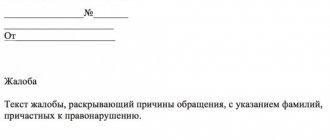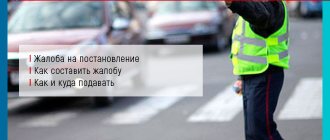A complaint against a school teacher is a document prepared by the parent (legal representative) of a student addressed to an official or regulatory organization in order to indicate significant violations on the part of a teacher of an educational institution. In 2021, when the issue of bullying is particularly relevant, every parent should know the grounds for filing a complaint, and should also be familiar with the procedure for sending a letter of complaint.
- Grounds for filing a complaint
- Where can I file a complaint?
- How to properly file a complaint
- Teacher Responsibility
- Samples of complaints against school teachers
Legislation
Any educational institution in Russia operates on the basis of the Charter, the provisions of which, in turn, are prescribed in Federal Law No. 273 of December 29, 2012.
The duties and responsibilities of the teaching staff of an educational institution are defined in Article 48 273-FZ.
The imposition of disciplinary sanctions is provided for by the Labor Code of the Russian Federation. In particular, the provisions of Art. 193 TK.
Dear readers! To solve your problem right now, get a free consultation
— contact the lawyer on duty in the online chat on the right or call: +7 (499) 938 6124 — Moscow and region.
+7 (812) 425 6761 — St. Petersburg and region. 8 (800) 350 8362 - Other regions of the Russian Federation You will not need to waste your time and nerves
- an experienced lawyer will solve all your problems!
For violations that have signs of causing significant harm to a child, criminal liability arises under the following articles:
- 156 of the Criminal Code of the Russian Federation. For dishonest performance of official duties in relation to a minor, associated with cruel treatment of a schoolchild.
- 150 part 2 of the Criminal Code of the Russian Federation. The norm implies the responsibility of the teacher for involving a teenager in committing criminal acts.
Responsibilities
When carrying out activities, the teacher must:
- Adhere to high professional standards, fully providing students with a set of knowledge taken into account by the taught discipline, in strict accordance with the approved curriculum.
- Comply with moral, ethical and legal standards, and do not deviate from the criteria of the professional code.
- Treat the honor and dignity of schoolchildren and their parents with respect.
- To promote the comprehensive formation of students’ personality, stimulate their curiosity, and develop intellectual abilities.
- Use in your work pedagogical methods that have won the trust of parents through efficiency and high learning outcomes.
- Be attentive to the characteristics of the psychological and physiological development of students, taking them into account when presenting educational material.
- Constantly improve your own knowledge and pedagogical level of teaching the subject.
- Periodically undergo statutory re-certification.
- Participate in mandatory and additional medical commissions provided for by law.
Know! Any violation of the teacher’s duties from the points regulated by the provisions of Article 48 273-FZ may entail a complaint from both parents and students or other participants in the educational process.
What actions are prohibited
Any deviation from the strict rules of law and morality committed by the teacher must be carefully studied, and if violations are detected, it should entail a proportionate penalty.
- methods that involve physical or psychological pressure on students are unacceptable;
- extending, shortening or canceling lessons;
- violation of business dress code, carelessness of appearance;
- insulting or humiliating children verbally or through action;
- frivolous treatment of students;
- extortion of money from schoolchildren or their parents (guardians);
- leaving students alone in classrooms of an educational institution;
- expel children from lessons or not allow late children to attend classes;
- refuse additional explanations of complex material;
- use slang expressions or phrases in speech;
- deliberately underestimate students' knowledge;
- discuss the parents or family relationships of the child in the presence of strangers.
When to write a complaint
Important! Please keep in mind that:
- Each case is unique and individual.
- A thorough study of the issue does not always guarantee a positive outcome. It depends on many factors.
To get the most detailed advice on your issue, you just need to choose any of the options offered:
- Use the online chat in the lower corner of the screen.
- Call: Federal number: +7 (800) 511-86-74
A complaint against a primary, secondary, or high school teacher must be filed in the following cases:
- negligent attitude towards a specific student or group, too high demands;
- improper performance of official duties;
- insults, shouting and rudeness towards children, use of force;
- the use of parenting methods that adversely affect the emotional state of the child (for example, humiliating him in front of his friends);
- collection of funds not agreed with the management of the educational institution;
- prohibition from attending classes due to unpreparedness, improper appearance, etc.;
- discrimination based on religion and nationality;
- forced physical labor for health reasons;
- grades are not for knowledge of the subject, but for effort and behavior;
- inclusion of material not from the school curriculum in the lesson topic;
- causing material damage (damage to gadgets, etc.);
- undeserved “twos” (underestimation of grades).
The protection of children's rights is regulated by paragraph 59 of Government Resolution No. 196.
Complaint against elementary, middle and high school teachers
A teacher has a tremendous influence on the formation of a child’s holistic personality.
It is possible and necessary to influence a teacher who has crossed the line of moral principles or the law by filing a complaint addressed to the school director or to one of the institutions authorized by the state apparatus to resolve conflicts in the field of public education.
The appeal may be personal and relate to the fact that the teacher has violated the rights of the student. However, it is not often that a teacher is biased towards an individual student. Rather, the incorrect attitude of the teacher extends to a group that corresponds to certain characteristics. In this case, we may be talking about a collective complaint from several representatives of children’s interests.
Important! If a single statement about the actions or inaction of a teacher can be regarded as a consequence of personal hostility on the part of the parent, then a collective one indicates the repetition of the violation, which makes it much more serious.
There is no established claim template. It is compiled in any form in compliance with the general order intended for writing such documents.
How to properly file a complaint
- In the upper right corner you should indicate the full name of the school, the full name of the director, and the address of the location of the institution.
- Enter the authentic details of the applicant.
- Mark the teacher against whom the complaint was made.
- In the text, you should not allow emotionally charged assessments of the teacher’s actions, much less stoop to insults. The statement must dryly reflect the meaning of the appeal, the essence of the violations committed by the school employee.
- Outline options for how, from the complainant’s point of view, the administration should respond to the subject of the complaint.
- Insert the date of compilation and signature of the citizen.
There are no particular differences in writing a protest against teachers at the levels of secondary schools. The approximate principle of forming a protest statement against a primary, junior, middle and senior teacher is the same.
Sample collective statement from parents
Collective petition
You can complain about a school teacher as a group. The writing rules will be the same.
Fill out the header, indicating the information of the director. All parents can be summarized by writing “parents of 6 B” class, school No. 5 in Moscow.
Main part: we state the essence of the incident, indicate the facts and data of those children and adults between whom there is a conflict.
Signatures and filing date are also included.
Within a month, an answer should come that resolves this issue. If there is no answer or you are not satisfied with it, you should file a complaint against the teacher further, to higher authorities.
Collective complaints are a prerogative. They are considered faster than individual ones. Applications signed “anonymous” will not be considered.
Where can I complain?
The list of organizations for filing a claim for unlawful actions of a teacher towards a child undergoing training is extensive.
Hotline
It is doubtful that the response to the appeal will be immediate or will follow in principle. The hotline of the Ministry of Public Education has not yet been developed as a method for resolving disputes between students and teachers, and this method is more of a reference nature.
To the school director
The first step towards achieving justice. The specific nature of relationships among the teaching staff is such that often an appeal to the school principal is even more effective than an application to the prosecutor's office.
RONO
If a complaint addressed to the head of the school does not have the desired effect, RONO becomes the second stage, where you should write about the teacher’s unworthy performance of professional duties.
The district department of public education almost always stands on the side of respecting the rights of the child and can take the most severe disciplinary measures.
To the Department
If the conflict has dragged on for a long time, it makes sense to file an appeal to the Department. However, much more often it does not come to this. The solution comes sooner.
To the prosecutor's office
Where disciplinary action appears appropriate, it is very possible that officers may perceive evidence of criminal conduct. In any situation that is not clear enough, controversial or piquant, contacting the prosecutor’s office becomes necessary.
Rosobrnadzor
The application can be submitted through the electronic admission service. But the structure is interesting rather for its expanded functionality. You can file a complaint with Rosobrnadzor not only against school officials, but also against municipal officials who are interfering with the normal and fruitful course of the educational process.
To the Ministry of Education
Citizens have the opportunity to send an angry message to the Ministry of Education. But, most likely, this is the last argument, which few people get to. Any conflicts are resolved at lower levels.
In what cases is it served?
- The teacher uses educational methods that have a negative impact on the child;
- The teacher uses educational methods that are considered illegal;
- The teacher uses physical punishment on students;
- The teacher discriminates against the child, puts him below other students;
- The teacher hinders the child's development;
- The teacher does not fulfill his duties at all;
- The teacher collects money from students for needs not provided for by the school management or not agreed upon with it;
- The teacher teaches information that is not included in the school curriculum.
How to submit and apply
The Ministry of Education hotline is available 24/7 at +7-495-539-55-19.
Online contact with Rosobrnadzor is available on the website https://obrnadzor.gov.ru/ru/ or by calling the help desk.
The remaining bodies, whose competence allows them to consider citizens’ complaints about the actions of teachers, are located at the place of residence of the students’ parents.
Personally
The most effective and correct thing is to contact the appropriate authority yourself, designed to protect the rights of children, and in every possible way fight the unprofessionalism of the teaching staff of the educational institution.
By mail
You can also complain by mail sent to the address of the competent authority by registered mail with notification.
Online
The method allows you to access the organization’s website in real time by filling out the appropriate electronic form or through the integrated portal “State Services”.
Responsibility
Depending on the severity of the offense and the completeness of the evidence base, the perpetrator is subject to disciplinary, administrative or criminal liability.
Dear readers! To solve your problem right now, get a free consultation
— contact the lawyer on duty in the online chat on the right or call: +7 (499) 938 6124 — Moscow and region.
+7 (812) 425 6761 — St. Petersburg and region. 8 (800) 350 8362 - Other regions of the Russian Federation You will not need to waste your time and nerves - an experienced lawyer will solve all your problems! Or describe the situation in the form below:









